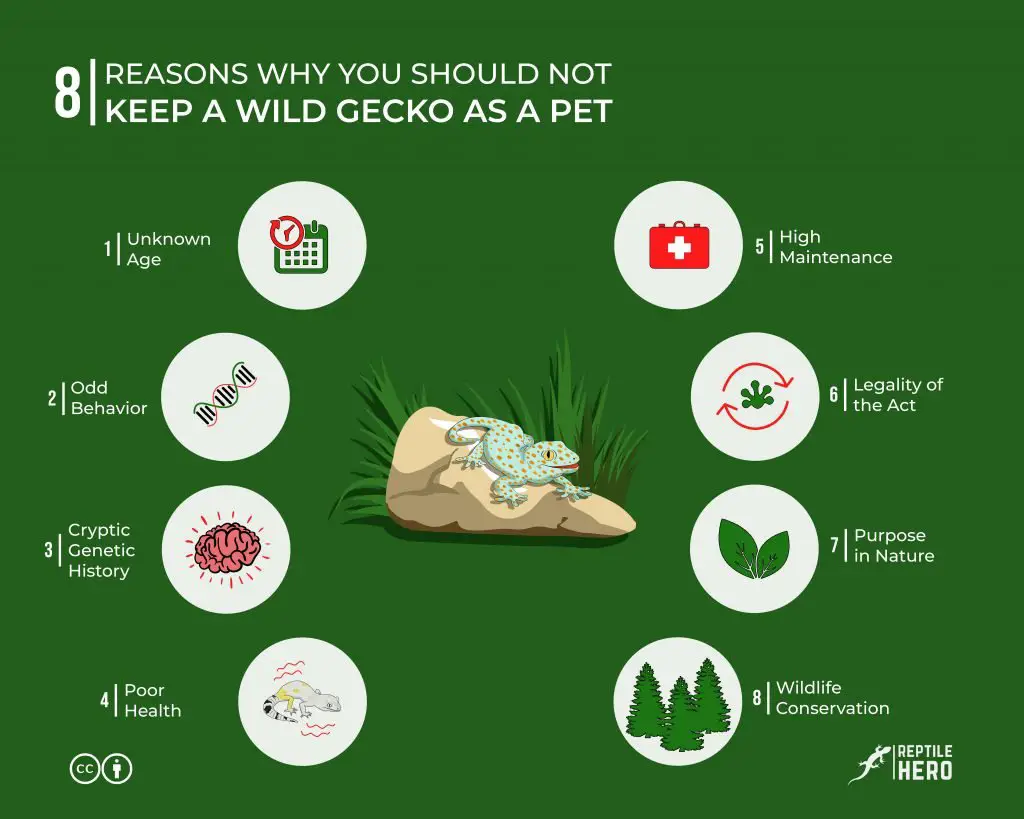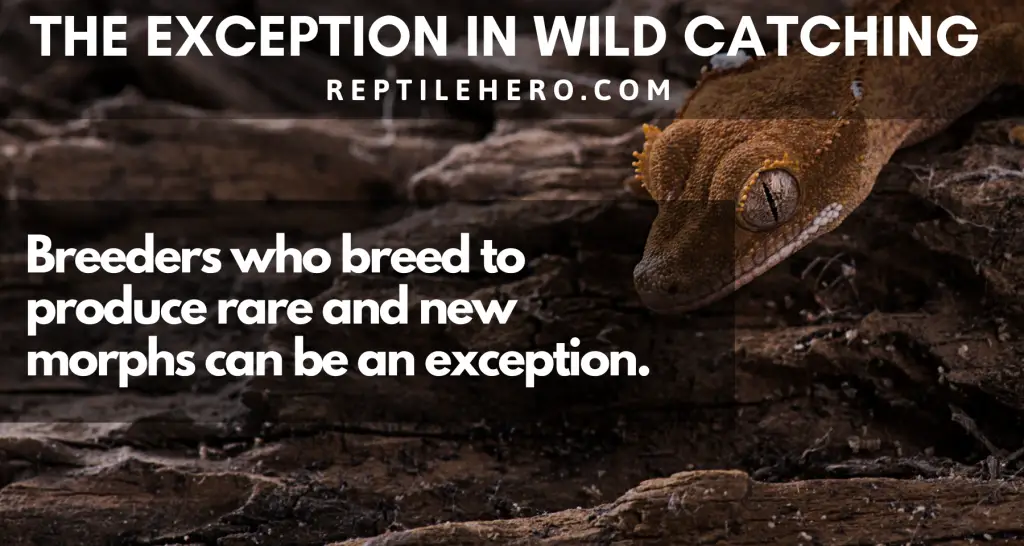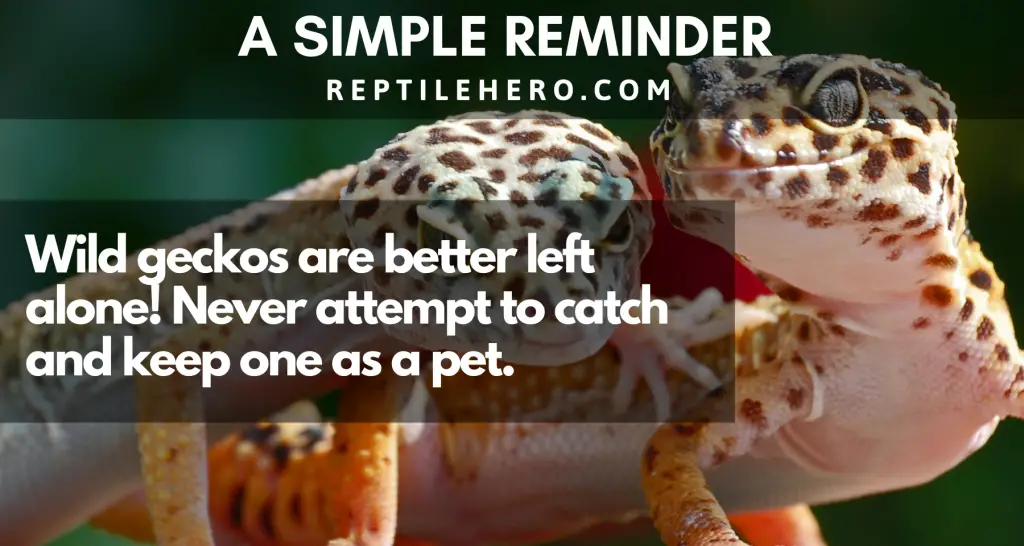8 Reasons Why You Should Not Keep A Wild Gecko as a Pet [1 Exception]
Did you have a rendezvous with a wild gecko outside the comforts of your home? Have you thought of catching it and keeping it as your pet? Or should you just leave it alone as is?
Catching a wild gecko may be more detrimental than beneficial. Here are the eight reasons why it is not recommended to keep a wild gecko as a pet:
- unknown age
- odd behavior
- cryptic genetic history
- poor health
- high maintenance
- legality of the act
- purpose in nature
- wildlife conservation
Stay with us to learn more about the reasons.

8 Reasons Why You Should Not
Whether you are a parent teaching your child how to be responsible or a young adult looking for a pet to accompany you, you may have the urge to catch the wild gecko outside your home for your reasons. However, you must take note of these eight reasons before pursuing what you are about to do.
1. Age
When catching a wild gecko, its age is unknown, making it uncertain how to properly take care of it.
Even though you have means of estimating the age by its weight and length, the uncertainty could crucially influence the care you provide. As a result, failure to give proper husbandry may adversely affect its health and well-being.
Aside from this, although knowing the age might seem trivial to you at first glance, other people may find it relevant, especially when they strictly want to keep the gecko from hatchling to mature adults. This circumstance could make a significant impact on the satisfaction of its pet owner.
2. Attitude
Aside from its uncertain age, a wild-caught gecko’s attitude would present a hurdle to you as its potential owner.
Wild geckos follow their instincts as wild animals. Hence, these reptiles exhibit and showcase their undomesticated behavior even when you own it as a pet. Acclimating one is difficult and meeting a tamed one in the wild is next to impossibility. Hence, domestication is the only workaround you have if you really want to push through owning it.
To successfully tame a wild-caught, you should basically be an expert reptile owner. Also, you must invest more time in its pieces of behavioral training, which could last at least six months.
Despite your dedication, you might not even have a chance to succeed in fully taming it. Furthermore, the gecko may not withstand the heavy stress of captivity, which could kill it—a not pleasant experience.
3. Genetics
A wild gecko is a gecko with no available genetic and breeding history.
If you are just a casual owner catching the wild gecko, this lack of information may not be noteworthy for you. You might not even care about this at all.
However, breeders would find this insufficiency a burden. Without these details, a wild gecko could latently introduce and proliferate genetic disorders and undesirable mutations to its future offspring when bred with a captive one.
4. Health
Fighting for food and resources with other species, wild geckos live in an environment where Darwinism strongly applies.
Geckos in their natural habitat could harbor a variety of health issues resulting from unrelentless living conditions.
Given that you are willing to nurse a wild-caught gecko back to its healthy conditions, it could just have countless health issues that you will struggle to tend to for a long time. What is worse is that you only have a slim chance of succeeding, which is not worth your effort.
Some health issues you could encounter with a dehydrated and starved wild gecko from its reservoir are [1]:
- Malnourishment
- Blatant Diseases
- Latent Illnesses
- Internal Parasites
- External Bacteria
Aside from these health issues, a female wild gecko would not likely be in a breeding condition for several months up to a year or so. This situation could be burdensome if you plan to impregnate the reptile for breeding new morphs.
Since many pieces of information about wild geckos and exotic pets are still undiscovered, petting and having close contact with a wild one would be risky. It increases the risk of infecting you with transmittable and unknown pathogens.
Aside from salmonellosis mentioned in our article on gecko feces, serious illnesses caused by virulent pathogens commonly found in wild geckos include [2]:
- Botulism
- Campylobacteriosis
- Leptospirosis
- Trichinellosis
I do not recommend owning a wild-caught gecko. However, if you insist on catching one, you should have an appointment and allow an exotic veterinarian to perform a thorough check of its health. It may be necessary to perform fecal float or fecal smear and other related tests, so you should prepare.
While potential health issues can be addressed and treated with proper care and medication, this does not fully guarantee that you can happily settle down with your new pet.
After acquiring the veterinarian’s feedback, you still need to observe strict quarantine periods and particular provisions. This step is a must to guarantee that the gecko does not spread its illness, especially if you have any other pets at home.
5. Maintenance
You might have thought that you saved up a few bucks because you caught a wild gecko in your garden for free. This idea is a misleading notion.
Taking care of a wild gecko requires special needs apart from a tame one’s routinary and basic husbandry. In effect, it is harder to maintain in the long run, which ends up costing a lot more than a captive-bred gecko.
If you are persistent on owning one, you must prepare yourself to shell out more money to accommodate the following:
- frequent specialized checkups
- regular laboratory tests
- numerous medications
- fixed and stringent diets
- supplemental nutritional needs
Besides these, you must also invest in separate areas and tanks for quarantine to not contaminate your other pets at home.
6. Legality
Catching a wild gecko as a pet does not only harm its health nor yours. You could also face legal actions against you for your conduct of keeping a native species in your area.
This circumstance is a hassle that could result in a criminal record for violating wildlife laws. For instance, Georgia has a notorious list of flora and fauna you should and should not own there.
7. Purpose
A wild gecko has its place and purpose in the complex chain of the web in nature.
Catching and owning one as a pet potentially disrupts the balance where it belongs. For example, it serves as a reservoir for various bacteria, parasites, and viruses that are normal in the wild for other animals to thrive.
Hence, domesticating a wild gecko as your pet introduces any pathogens to your fragile environment—an environment foreign to the microorganisms. This circumstance would be detrimental to your health, especially if the germs are transmittable to humans.
For instance, as stated in our previous article about gecko poop, its fecal matter is known to carry salmonella—an infectious bacteria to humans.
8. Conservation
Keeping a single wild gecko as a pet may sound harmless to you. However, catching one is impactful since you are depleting the native populations of the species.
For instance, the wild gecko you caught could have produced more offspring in nature during the breeding season to increase its population.
By capturing it, you impede this cycle. Furthermore, you only induce stress on the reptile in its tank, rendering it unable to foster future progeny to maintain its population while.
The Only Reason Why You Can
As a strong advocate against catching wild animals to keep as pets, I suggest you not keep the wild gecko nor any wild animals you find loitering your yard.
However, there is a reason with two interrelated effects where you can capture them as pets. Strictly, you must be an expert—an experienced breeder—to do so.
Breeding
Having a wild one mate with your collection of captive-bred introduces a new lineage for genetic recombination. Thus, if you are a knowledgeable breeder, I can recommend catching a wild gecko for breeding purposes.
As a result of instigating a captive gecko to procreate with a wild-caught, you could produce rare offspring with new morphs. This instance increases diversity in the gene pool of captive-bred ones that can benefit future generations.
Hence, this situation can be a rewarding experience for you, but I have a serious note if you must.
The wild-caught could die faster despite providing all its particular demands. You must breed it as soon as possible once it has been acclimated to the new environment. This way, its life does not end up in vain if it successfully reproduces.

The Effect of Captivity
Captivity adversely affects wild geckos even after you think a few weeks of living inside a new environment was enough for it to adjust. Thus, you must take this effect on the reptile into significant consideration before doing what you plan to do with that gecko in your backyard.
Stress
I am pretty sure you have experienced moving into a new home once in your life. Or if not, you have probably traveled into an unknown remote location and stayed there for a few days for whatever reason. What have you felt? Uncomfortable and stressed.
Just like us, when we move into a different place and stay there, whether for good or not, wild geckos would suffer tantamount stress when transferring into an unfamiliar environment.
To convince you further how captivity could lead to severe stress on a wild gecko, a sick one would need a series of treatments. This course includes initial screening and follow-ups until the final treatment interrupts the infected reptile’s parasitic cycle. Otherwise, failure to complete such would discredit the treatment’s progress.
Besides, what makes things worse is the unknown age of the wild-caught. If the gecko is older, extracting it from its natural habitat would make it feel more distressed.
Not to mention the act of capturing it, which is equally traumatizing, a foreign setting inside a small tank with unusual food, artificial plants, and undesired handling can massively subdue its immune system to sickness.
Though it could settle down after more than a month, the gecko would perceive those to be stressful to the point of death.
4 Advantages of A Captive-Bred
If you are taking into consideration owning a gecko, forget about catching that wild one in your front yard. The better option for you to pursue is to purchase one from a trusted and expert breeder. You would learn more tips from the seller while securing these four advantages over a wild-caught.
1. Behavior
Breeders have told me that captive-bred geckos usually have better temperaments and are more docile than that wild one you are itching to capture.
Although it is considered by many that a captive-bred gecko is an exotic pet, it is practically not considered domesticated despite having adapted to the usual routine of a life being a person’s pet. However, it is undoubtedly tamer due to losing a little more of its wild instinct after generations of captive-breeding.
2. Choice
Getting a gecko from a breeder earns you the freedom of choice. Aside from knowing its age, you have the option to select a specific morph that suits your preference best. Furthermore, you may also have the capability to choose a gender you want.
In case the type of gecko you are looking for is not on the breeder you visited, you still have other alternatives to check on other breeders for more varying morphs. These are all available for you once you get a captive-bred, unlike getting a wild-caught wherein you have no other choice.
3. Ignorance
This advantage could be more of a guilt-reduction on your part as a pet owner. But the idea behind this is that a captive-bred gecko is naive.
It is ignorant in the sense that a captive-bred is unaware of the distinction between the greatness of its supposed natural habitat and the alleged inferiority of its tank.
Whether a captive-bred would be more joyful in its tank rather than free in the wild is vague. However, it is inevitable that with your proper care and husbandry, you ensure its life inside the enclosure to be more bearable than the severe conditions in the outside world.
4. Overall Condition
Aside from you having less guilt and more freedom, you are well-informed about its age, morph, and probably gender when applicable if you opt to get a captive-bred gecko.
More importantly, choosing a captive-bred gecko tends to have a better overall health condition.
Hatchlings and juveniles are generally more resilient and hardier as a result of being born from well-fed and well-cared parents living in a sanitary condition, free from pathogens found in the wild.
Furthermore, young adult and mature ones you can obtain from breeders are less likely to inherently have diseases due to the proper screening and treatment protocols the seller is responsible for giving.
What Should You Do?
If you plan to own a reptile, the first step to becoming a responsible gecko parent is to buy from a trusted breeder and not catch one from the wild. It does not mean you found one in the wild, and you can keep it as your pet.
Unlike a captive-bred and its tailored demands, a wild gecko is a wild animal. Hence, it fosters convoluted behavioral, dietary, psychological, and social needs. More often than not, keeping it inside your tank as a pet does not satisfy the requirements that nature would straightforwardly provide.
Therefore, it should not be in captivity and must be with members of its species. After all, it is a wild gecko.

Takeaways
Catching a wild gecko to keep as a pet can only be useful if an expert breeder does it. Otherwise, the captor would bring about harm to himself and the reptile.
Capturing a wild gecko would only provoke insurmountable stress to the reptile, which could lead to its unfortunate death.
Opting for a captive-bred gecko is more favorable due to getting a more tame one with a better overall health condition.
Sources
[1] https://vetmed.tamu.edu/news/pet-talk/captive-bred-vs-wild-caught/
[2] https://www.hpsc.ie/a-z/zoonotic/reptilesandrisksofinfectiousdiseases/

![The 8 Differences Between A Newt And A Leopard Gecko [+ Fun Fact!]](https://www.reptilehero.com/wp-content/uploads/2021/04/Newt-vs-Gecko-Infographics-768x614.jpg)


![How Much Electricity Does a Gecko Use? [Full Bill Breakdown]](https://www.reptilehero.com/wp-content/uploads/2021/05/word-image-20-768x576.png)


